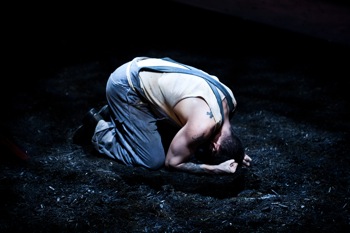Native Earth presents Tara Beagan’s free as injuns at Toronto’s Buddies in Bad Times Theatre
On a criss-crossed stage with red painted wood and gates to resemble a farm, over a thick layer of dark soil and surrounded at all four sides by the audience, a dark family drama is presented.
Based on O’Neill’s Desire Under the Elms, which in turn is the American retelling of ancient Greek tragedy, free as injuns arrives with the intention to symbolize and speak of the current state of Canada’s relationship with its Aboriginal and multicultural society using its characters: the white autocrat father, the three sons, a new wife and a newborn baby.
Ephraim is the farmer governing over his three sons, and they despise their father and desire the land they believe they deserve. Each physically different due to an excellent choice in casting (John Ng, Ash Knight and James Cade), they all become deeply embittered when they find out the head of household has a new half-Aboriginal wife – and inheritor of the land.
One of these sons, Even, is in love with his father’s new wife and battles his affection for her with the frustration of her betrothment. These Oedipal plot points of the story are slowly introduced in the first hour of the show while the elm branches hang from above, watching over all that happens on this dysfunctional, incestuous farm – an omnipresence akin to the narrating voice of Even’s late mother.
O’Neill’s is a dark script and this transcription onto a new slate is certainly compelling. A myriad of symbolism in O’Neill’s pre-existing work with Beagan’s Canadian translation creates an unheard of intersection of drama.
Jerry Franken, who performed at Stratford as Polonius and practiced medicine on television show Road To Avonlea, delivered an outstanding and spellbinding performance as the father. PJ Prudat and James Cade, though both young, work hard to portray their characters’ struggles. I very much loved the banter and fighting between John Ng and Ash Knight as well.
Jason Burnstick’s score was excellent and added much to the production. The stage design and use of soil and wooden planks were extremely imaginative and tactile – offering a palpable sensibility to the production and connecting it with the words spoken in the play.
The audience must work hard to understand playwright Beagan’s intentions behind the play, particularly the ending. Whereas the O’Neill play ends definitively tragic and concrete, I cannot be as certain with free as injuns – although in my mind it offers a similar sad and impactful ending.
What the play offers as an emotional commentary is invaluable to our Canadian repertoire at this moment in time. While parts of the dialogue felt overused, such as recitations of Scripture and Even constantly calling out to his mother, the rest was fresh and very clever. The scenes flipping between extreme sensuality and unrelated humour were particularly ingenious.
With this just-right combination of actors to flesh out the roles and symbolism deserving of its own Coles Notes book, Tara Beagan’s interpretation of a pessimistic New England play breathes Aboriginal-Canadian life into a classic script.
Details
Warning: this show has nudity.
– free as injuns is playing at the Buddies in Bad Times Theatre (12 Alexander St)
– Show times are February 28th to March 18th, 2012, Tuesdays to Saturdays 8pm, Sundays at 2:30pm
– Ticket prices range from PWYC to $20
– Tickets are available online at www.totix.ca, by phone at 416.975.8555 or at the box office


Meegwetch for an intelligent review, Tiffany. Particular thanks for acknowledging the importance of capitalizing the term “Aboriginal” when referring to First Nations people.
You’re welcome, and thank you for taking the time to comment. I do hope in the near future you can publish an analysis of your play, it would be interesting to read it. And I’m not sure why that capitalization isn’t standard practice – it should be!